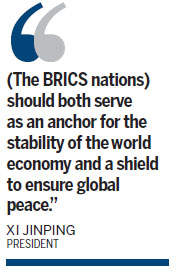Leaders at summit call for 'equitable' global governance
|
Advancing growth China's proposals at the BRICS summit, in President Xi Jinping's words: We should unswervingly push forward sustainable economic growth, adhere to inclusive growth, turn quantitative growth into qualitative growth, and coordinate economic development, social development and environmental protection. Efforts are expected in launching all-around economic cooperation, building an integrated market in trade and investment areas, promoting people-to-people exchanges, and realizing the early operation of the BRICS development bank and a contingent reserve arrangement. Efforts should be made in building a favorable external environment for development, improving global economic governance, strengthening countries' representation of their governments and their right to a voice, and strengthening the coordination of global macroeconomic policies. We should boost the moral appeal of BRICS members to other nations, and BRICS countries should provide solutions on international affairs, seek justice and practice equality. |
Xi, speaking at a summit of leaders from the five BRICS nations - Brazil, Russia, India, China and South Africa - in the Brazilian coastal town of Fortaleza, described political and economic issues as being interwoven.
He said that if the BRICS countries want to achieve peace and prosperity for their nations and people, they should "walk on two legs", emphasizing economic cooperation while at the same time strengthening coordination in the political arena.
"(The BRICS nations) should both serve as an anchor for the stability of the world economy and a shield to ensure global peace," Xi said.
Quoting an ancient Chinese tale that describes the importance of concerted efforts when a big bird flies and a horse gallops, Xi said that if the BRICS nations pool their thoughts and efforts in a common direction, they will spread their wings and fly higher and faster.
"I'm fully confident about this," said Xi, who was joined by Brazilian President Dilma Rousseff, Russian President Vladimir Putin, Indian Prime Minister Narendra Modi and South African President Jacob Zuma.
The summit occurs as the international community tries to address such challenges as making a strong recovery from the global financial crisis; sustainable development; climate change; and mapping out a post-2015 development agenda. At the same time, the world is facing persistent political instability and conflicts in various global hot spots.
 The Fortaleza Declaration, issued after the summit, says that international governance under its current structure and power configuration shows increasing signs of losing legitimacy and effectiveness, and that traditional, ad hoc arrangements often are carried out at the expense of multilateralism.
The Fortaleza Declaration, issued after the summit, says that international governance under its current structure and power configuration shows increasing signs of losing legitimacy and effectiveness, and that traditional, ad hoc arrangements often are carried out at the expense of multilateralism.
"We believe the BRICS are an important force for incremental change and reform of current institutions toward more representative and equitable governance, capable of generating more inclusive global growth and fostering a stable, peaceful and prosperous world," says the declaration, referring to the International Monetary Fund and World Bank, which are controlled by Europe and the United States.
The five nations condemned unilateral military intervention and economic sanctions in violation of international law, and they recognized norms of international relations, saying that "no state should strengthen its security at the expense of the security of others".
The declaration expressed concerns over the crises in South Sudan, Syria, Afghanistan, Iraq and Ukraine, as well as climate change.
Huang Wei, a researcher from the Institute of World Economics and Politics in the Chinese Academy of Social Sciences, said that if the BRICS nations succeed in structural adjustment and maintain their momentum, the group will play a bigger role in the world economy and on the global stage.
Kenneth Lieberthal, a senior fellow at the Brookings Institution, said the kind of relationship building and intensive consultation at the BRICS summit will allow the five nations, all G20 members, to develop their talking points ahead of the G20.
Lieberthal said the newly launched development bank and reserve fund established by the BRICS nations are "not to bring down the current system, but in their term, democratize it more".
Contact the writer at [email protected]
